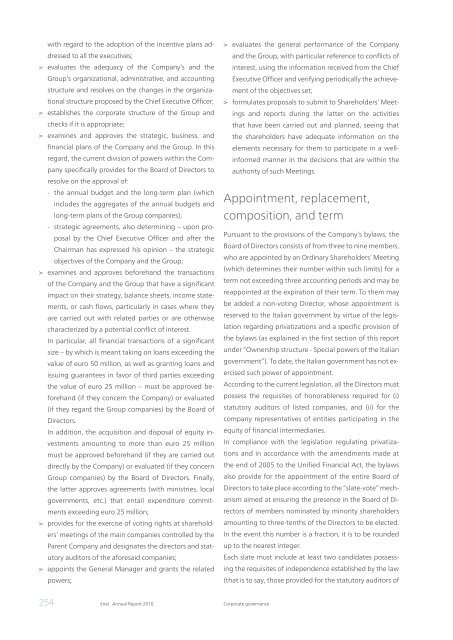Annual Report 2010 - Enel.com
Annual Report 2010 - Enel.com
Annual Report 2010 - Enel.com
You also want an ePaper? Increase the reach of your titles
YUMPU automatically turns print PDFs into web optimized ePapers that Google loves.
with regard to the adoption of the incentive plans addressed<br />
to all the executives;<br />
> evaluates the adequacy of the Company’s and the<br />
Group’s organizational, administrative, and accounting<br />
structure and resolves on the changes in the organizational<br />
structure proposed by the Chief Executive Officer;<br />
> establishes the corporate structure of the Group and<br />
checks if it is appropriate;<br />
> examines and approves the strategic, business, and<br />
financial plans of the Company and the Group. In this<br />
regard, the current division of powers within the Company<br />
specifically provides for the Board of Directors to<br />
resolve on the approval of:<br />
- the annual budget and the long-term plan (which<br />
includes the aggregates of the annual budgets and<br />
long-term plans of the Group <strong>com</strong>panies);<br />
- strategic agreements, also determining – upon proposal<br />
by the Chief Executive Officer and after the<br />
Chairman has expressed his opinion – the strategic<br />
objectives of the Company and the Group;<br />
> examines and approves beforehand the transactions<br />
of the Company and the Group that have a significant<br />
impact on their strategy, balance sheets, in<strong>com</strong>e statements,<br />
or cash flows, particularly in cases where they<br />
are carried out with related parties or are otherwise<br />
characterized by a potential conflict of interest.<br />
In particular, all financial transactions of a significant<br />
size – by which is meant taking on loans exceeding the<br />
value of euro 50 million, as well as granting loans and<br />
issuing guarantees in favor of third parties exceeding<br />
the value of euro 25 million – must be approved beforehand<br />
(if they concern the Company) or evaluated<br />
(if they regard the Group <strong>com</strong>panies) by the Board of<br />
Directors.<br />
In addition, the acquisition and disposal of equity investments<br />
amounting to more than euro 25 million<br />
must be approved beforehand (if they are carried out<br />
directly by the Company) or evaluated (if they concern<br />
Group <strong>com</strong>panies) by the Board of Directors. Finally,<br />
the latter approves agreements (with ministries, local<br />
governments, etc.) that entail expenditure <strong>com</strong>mitments<br />
exceeding euro 25 million;<br />
> provides for the exercise of voting rights at shareholders’<br />
meetings of the main <strong>com</strong>panies controlled by the<br />
Parent Company and designates the directors and statutory<br />
auditors of the aforesaid <strong>com</strong>panies;<br />
> appoints the General Manager and grants the related<br />
powers;<br />
254 <strong>Enel</strong> <strong>Annual</strong> <strong>Report</strong> <strong>2010</strong><br />
Corporate governance<br />
> evaluates the general performance of the Company<br />
and the Group, with particular reference to conflicts of<br />
interest, using the information received from the Chief<br />
Executive Officer and verifying periodically the achievement<br />
of the objectives set;<br />
> formulates proposals to submit to Shareholders’ Meetings<br />
and reports during the latter on the activities<br />
that have been carried out and planned, seeing that<br />
the shareholders have adequate information on the<br />
elements necessary for them to participate in a wellinformed<br />
manner in the decisions that are within the<br />
authority of such Meetings.<br />
Appointment, replacement,<br />
<strong>com</strong>position, and term<br />
Pursuant to the provisions of the Company’s bylaws, the<br />
Board of Directors consists of from three to nine members,<br />
who are appointed by an Ordinary Shareholders’ Meeting<br />
(which determines their number within such limits) for a<br />
term not exceeding three accounting periods and may be<br />
reappointed at the expiration of their term. To them may<br />
be added a non-voting Director, whose appointment is<br />
reserved to the Italian government by virtue of the legislation<br />
regarding privatizations and a specific provision of<br />
the bylaws (as explained in the first section of this report<br />
under “Ownership structure - Special powers of the Italian<br />
government”). To date, the Italian government has not exercised<br />
such power of appointment.<br />
According to the current legislation, all the Directors must<br />
possess the requisites of honorableness required for (i)<br />
statutory auditors of listed <strong>com</strong>panies, and (ii) for the<br />
<strong>com</strong>pany representatives of entities participating in the<br />
equity of financial intermediaries.<br />
In <strong>com</strong>pliance with the legislation regulating privatizations<br />
and in accordance with the amendments made at<br />
the end of 2005 to the Unified Financial Act, the bylaws<br />
also provide for the appointment of the entire Board of<br />
Directors to take place according to the “slate-vote” mechanism<br />
aimed at ensuring the presence in the Board of Directors<br />
of members nominated by minority shareholders<br />
amounting to three-tenths of the Directors to be elected.<br />
In the event this number is a fraction, it is to be rounded<br />
up to the nearest integer.<br />
Each slate must include at least two candidates possessing<br />
the requisites of independence established by the law<br />
(that is to say, those provided for the statutory auditors of









